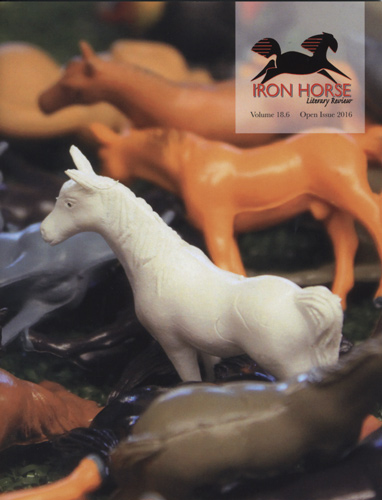Iron Horse Literary Review – Open Issue 2016
In the 2016 Open Issue, Iron Horse Literary Review opens its doors to two new types of writing: translation and graphic literature. It’s the graphic piece that opens this issue which ultimately grabbed my eye and ushered me in to the rest of the work.
In the 2016 Open Issue, Iron Horse Literary Review opens its doors to two new types of writing: translation and graphic literature. It’s the graphic piece that opens this issue which ultimately grabbed my eye and ushered me in to the rest of the work.
While winter is all but over here in Michigan—buds appearing on trees and robins migrating back north—Nick St. John invites it to stay a little longer in “There was a day in the winter.” In a short ten panels, St. John captures the calm feeling of sitting at home with someone, on a snow day or otherwise, and hoping the day stretches on forever. It is so ordinary, so unexciting, but that is what makes it relatable, comfortable, and comforting. St. John’s graphic work appears elsewhere in the issue with “In the Saddle,” a unique and interactive piece that is just as appealing as this quiet one.
Doug Rampseck hangs onto winter for a little while longer, his poem “Winter Fingerprints” an irresistible piece. Using the intimacy of human bodies and snow stacking up against them, the speaker shows our limitations as humans, wondering:
What shall we do
in this life
with a scaffolding of bones
beneath our skin?
For starters, we can breathe, he finds, and we can connect with other, limited, human bodies in our breathing, “languaging / without spittle.” Rampseck’s use of language in this poem is intimate, almost bordering on sensual, like warmth found in the middle of winter.
Traveling away from winter themes, Ingrid Keenan brings readers into a familiar story, giving the tale of Hansel and Gretel a unique spin in “Hansel and Gretel’s Mother Waits by the Door for Her Children to Come Home.” Keenan brings the story into present day: the police are called when the children go missing, and the siblings leave after a modern argument caused by modern poverty:
Fact: It was Thursday, so there was no money in the bank, and no more food in the cupboard. She would shop tomorrow, after she got paid, but today there was no extra. She had four dollars and twelve cents in her wallet, and one last box of pasta [ . . . ].
“She” is the siblings’ mother, who the story focuses on instead of the children, a woman portrayed as “[t]he bad mother” in the original version of the tale. Keenan gives us a different view, one that we can empathize with: Hansel and Gretel’s mother is trying her best with what little she has, a human capable of mistakes that she regrets. With this new view, we are left to realize we have vilified Hansel and Gretel’s mother the same way we vilify the parents of missing children in the comment sections of news articles: who tells their children to walk to the store alone at night, and what did she expect when they were found by an even worse villain? Later in the issue, the editors interview Keenan, where she allows readers a behind-the-scenes look into the story, a nice addition.
In Ruth Goring’s contributor bio, she also gives us some behind-the-scenes information about her poem “Medellín,” the first translated work accepted into Iron Horse. Slowly, the speaker reveals their lover is one of the missing people in Medellín, the Colombian city in which Goring grew up. The city is colorful and alive, the people hardworking and innovative, she says in her bio, but there is a darkness as well “roll[ing] down the mountains secretly each night.” Despite the darkness, despite the missing, one can still sense a feeling of fondness to the city from the speaker.
The 2016 Open Issue of Iron Horse Literary Review opens the door for more exciting and innovative work in future issues, offering readers a varied array of talent and writing styles. If you haven’t read an issue of the bimonthly magazine yet, now is the perfect time to do so.
[www.ironhorsereview.com]





